 Petzlover
Petzlover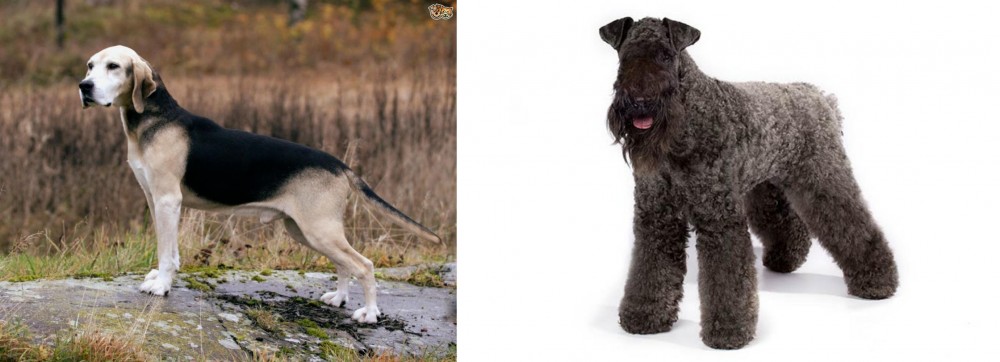 Dunker is originated from Norway but Kerry Blue Terrier is originated from Ireland. Both Dunker and Kerry Blue Terrier are having almost same height. Both Dunker and Kerry Blue Terrier are of same weight. Both Dunker and Kerry Blue Terrier has same life span. Both Dunker and Kerry Blue Terrier has almost same litter size. Dunker requires Low Maintenance. But Kerry Blue Terrier requires Moderate Maintenance
Dunker is originated from Norway but Kerry Blue Terrier is originated from Ireland. Both Dunker and Kerry Blue Terrier are having almost same height. Both Dunker and Kerry Blue Terrier are of same weight. Both Dunker and Kerry Blue Terrier has same life span. Both Dunker and Kerry Blue Terrier has almost same litter size. Dunker requires Low Maintenance. But Kerry Blue Terrier requires Moderate Maintenance
 Known as the Norwegian Hound, the Dunker hails from Norway. Bred and named after breeder Wilhelm Dunker to be a robust scenthound, Norwegian Scenthounds were crossed with a Russian Harlequin Hound because this particular dog was an excellent scent trailer and it could stand up to the freezing conditions of Norway.
Known as the Norwegian Hound, the Dunker hails from Norway. Bred and named after breeder Wilhelm Dunker to be a robust scenthound, Norwegian Scenthounds were crossed with a Russian Harlequin Hound because this particular dog was an excellent scent trailer and it could stand up to the freezing conditions of Norway.
The Dunker become popular in the mid-19th century in other Scandinavian countries. Hunters liked its intelligence, its robustness and its speed and strength. In 1902 a club was founded for the breed and in the same year the Norwegian Kennel Club recognized the Dunker.
The Dunker started dying out after the war, and in the late 1980s breeders of the Dunker petitioned to allow them to cross the remaining Dunkers with scenthounds. Today the dog is known in Norway but is uncommon outside Scandinavia.
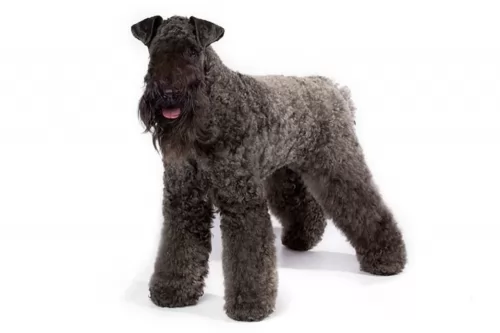 The Kerry Blue Terrier hails from Ireland, with the name of the dog coming from a place known as County Kerry, and Blue being the color of the dog's coat.
The Kerry Blue Terrier hails from Ireland, with the name of the dog coming from a place known as County Kerry, and Blue being the color of the dog's coat.
The Kerry Blue was originally bred to control rats, rabbits and otters and was actually a working dog for a host of different jobs.
It was in 1922 that the United States Kerry Blue Terrier Club was founded and recognized by the AKC in 1924.
 The Dunker is a medium sized dog which stands at between 50-55cms with females being slightly smaller at 47-52cms. They usually weigh between 11-18kg and look similar to other scenthounds, being muscular and athletic.
The Dunker is a medium sized dog which stands at between 50-55cms with females being slightly smaller at 47-52cms. They usually weigh between 11-18kg and look similar to other scenthounds, being muscular and athletic.
The ears of the Dunker are floppy, the tail is long and carried straight with a bit of a curve, the nose is large and black as well as the eyes, but some dogs have light eyes which can even be blue.
The coat of the Dunker is straight and dense and this coat of his is well known for the unique color of the coat – blue or black dappled, while some dogs will have black, tan and white markings. White faces are preferred but you will find dogs with black masks.
This is a non-aggressive dog and can become quite friendly when trained and socialized.
They are dogs that form strong bonds with their owners, being particularly good around children. They get on well with dogs and other pets in the home.
They’re intelligent dogs and are are easy to train. In fact, training and socialization is recommended for this dog as he does tend to be a bit stubborn.
Training ensures he is relaxed and obedient. He is an active dog and will certainly require some exercise each day. He’ll respond willingly if you call him to join you in your jogging- or cycling outings.
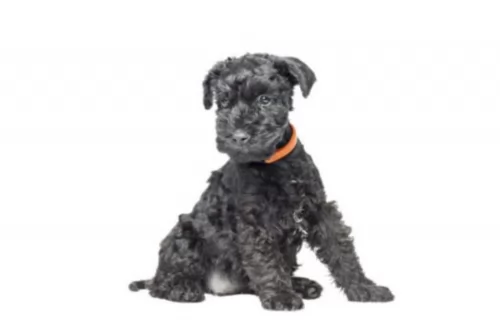 The Kerry Blue is a small dog standing at between 44 to 51cm and weighing anything between 15 and 18kg. He has dark eyes which give him that typical alert Terrier expression.
The Kerry Blue is a small dog standing at between 44 to 51cm and weighing anything between 15 and 18kg. He has dark eyes which give him that typical alert Terrier expression.
The ears are small and are carried up before flopping down. The high-set tail has always been customarily docked, giving him a compact, jaunty appearance but these days, the tail tends to be left long, curling somewhat over the back.
He has a coat which is quite wavy or curly and comes in different shades of grey or blue, while the puppies are born black, gradually becoming more blue. The dog is considered to be hypoallergenic as it doesn't shed a lot.
Kerry Blue Terriers are strong willed dogs, but with training and socialization they respond well to instructions such as sit, come, lie-down and stay. As a Terrier breed he is feisty, lively, strong-willed, stubborn, independent and impulsive. They are loyal and affectionate towards their owners and are amicable with children and pets in the home.
Training and socialization develops a balanced attitude around his human family, other animals in the home and around strangers. He is an active dog too so whether he lives in the city or the countryside, he will require a lot of exercise as he is full of life.
You can’t just put him in the backyard and forget about him. He is an intelligent, social dog who will only do well when he is counted in as a family member.
 The Dunker is such a good tempered dog and he will be happy to settle in the city or the countryside with his owner.
The Dunker is such a good tempered dog and he will be happy to settle in the city or the countryside with his owner.
When you look at his history, he is a hunting dog, used for hunting rabbits. Being an active breed, he is better suited to living in a home where there is at least a fair sized garden.
He isn’t a high maintenance dog either, so no special attention to grooming is required. Being a fairly healthy breed, he isn’t likely to develop any serious health issues too. This low-maintenance, undemanding Norwegian Hound makes a splendid pet.
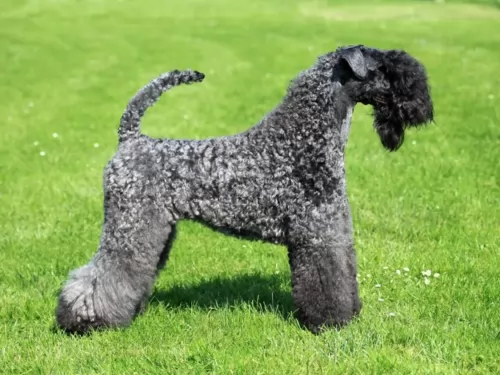 When you bring a Kerry Blue Terrier into your home and your life, you’re going to have a jaunty, lively, comical pet in your home, as he certainly has the reputation of making people laugh.
When you bring a Kerry Blue Terrier into your home and your life, you’re going to have a jaunty, lively, comical pet in your home, as he certainly has the reputation of making people laugh.
He is such an intelligent dog too and has no difficulty with learning new tricks. He takes his role of watchdog seriously too, as he loves his human family and wants to be looking out for them.
When you bring a Kerry Blue Terrier into your home, you can be assured of jolly good fun from a true canine companion.
 The Dunker dog can live to reach a ripe age of 12 to 15 years. There are some health issues he may face -
The Dunker dog can live to reach a ripe age of 12 to 15 years. There are some health issues he may face -
Partial or complete hearing loss can come about because of dirt or wax build-up in the ear canals. It can be because of an untreated ear infection, an injury or even old age.
Your veterinarian can examine your dog’s ear canal. Certain dog breeds such as the Dunker and others are more predisposed to deafness and you’ll find your dog responding slowly to your voice or he may be totally startled when woken.
Your vet will determine the type of treatment for your dog if an ear infection for instance is suspected. Treatment in this case may involve cleaning wax out of the ears or getting rid of overgrown ear hair.
Hip dysplasia is an inherited condition with your dog where bone rubs against other bone. Your Dunker dog will be in pain and his movement could be limited and he may even become lame. Get your pet to the vet because there are a number of treatment options.
Take a look at your pet’s eyes so that you’re aware of cloudiness, inflammation, discharge, a change in eye color or red eyelid lining. Take him to the vet if you suspect something serious, but in the meantime you can also gently wipe over your pet’s eyes to remove any discharge.
If you do need to bath your pet, make sure to protect his eyes before applying any lotion.
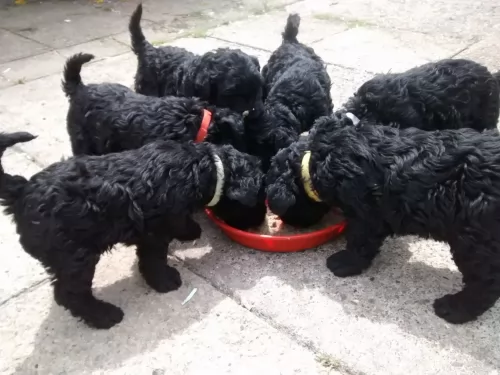 You aren’t going to be running to the vet often with your Kerry Blue as he is a healthy dog breed. However there are some common dog diseases that even the most healthiest of dogs can succumb to.
You aren’t going to be running to the vet often with your Kerry Blue as he is a healthy dog breed. However there are some common dog diseases that even the most healthiest of dogs can succumb to.
Always feed your dog the very best food there is so that he has a strong immune system that can fight off disease.
This is the inward rolling of the eyelid which can irritate the dog’s eye and even cause vision loss. Surgery can treat the problem.
Every dog can succumb to cancer. You may well find a lump or even detect a sore that won’t heal. Treatments for cancer can include medicines, chemotherapy and surgery.
This is an inherited condition to do with the hip joint. It can result in pain for your dog and even lameness. When you discover your pet no longer wants to play and he battles to get up after lying down, he will need to go to the vet. Dogs with this debilitating disease should never be bred.
 The Dunker is a dog with stamina and energy and he will need a walk every day as well as some other forms of vigorous exercise. The idea is to involve a dog like this in all your activities, whether you go running, swimming or cycling.
The Dunker is a dog with stamina and energy and he will need a walk every day as well as some other forms of vigorous exercise. The idea is to involve a dog like this in all your activities, whether you go running, swimming or cycling.
The Dunker isn’t going to require you to spend a lot of money on maintenance for him. A good brush-down twice a week will be adequate as he is a fairly heavy shedder and brushing him will get rid of all those loose hairs. It is also time to check him over for fleas and ticks too.
Other grooming aspects to check will include nail trimming, checking the inside of the dog’s ears for excess wax build-up and dirt.
Dental care is of major concern because teeth left unattended can result in mouth bacteria. This bacteria enters the blood stream and results in systemic infection. Sometimes the bad teeth can be so painful that a dog no longer wants to eat.
It is imperative to brush your pet’s teeth at least 2 or 3 times a week with a special dog toothbrush and toothpaste.
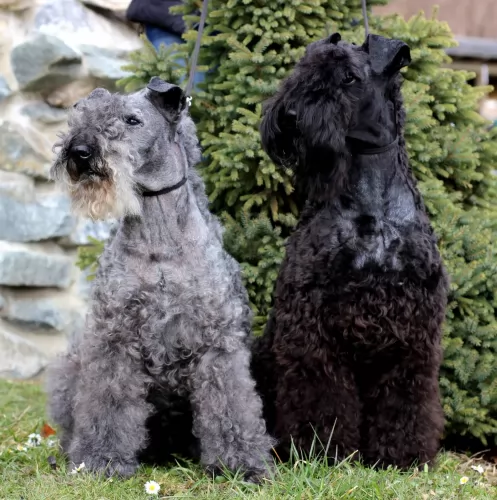 The Kerry Blue’s coat doesn’t shed a lot but it’s a curly coat that will require brushing at least twice a week. He will also require clipping and trimming if you want to keep the coat manageable.
The Kerry Blue’s coat doesn’t shed a lot but it’s a curly coat that will require brushing at least twice a week. He will also require clipping and trimming if you want to keep the coat manageable.
Nutrition is a key part of a healthy Kerry Blue Terrier and instead of just plonking down a bowl of dry kibble every day, make his mealtimes something to look forward to, more sustaining and more interesting.
Top quality kibble is good every now and then but try mixing in some cooked chicken, brown rice, pasta and vegetables occasionally as well as a little bit of raw meat. You will be rewarded with bright eyes, a wet nose, bushy, wagging tail and less trips to the vet.
Make sure there is always a supply of fresh, cool water for him.
Active and lively, your Kerry Blue will need lots of robust exercise – a daily walk as well as ball games which ensure his muscles are kept strong and toned. Not only that, this exercise is important for keeping him fit and also mentally alert.